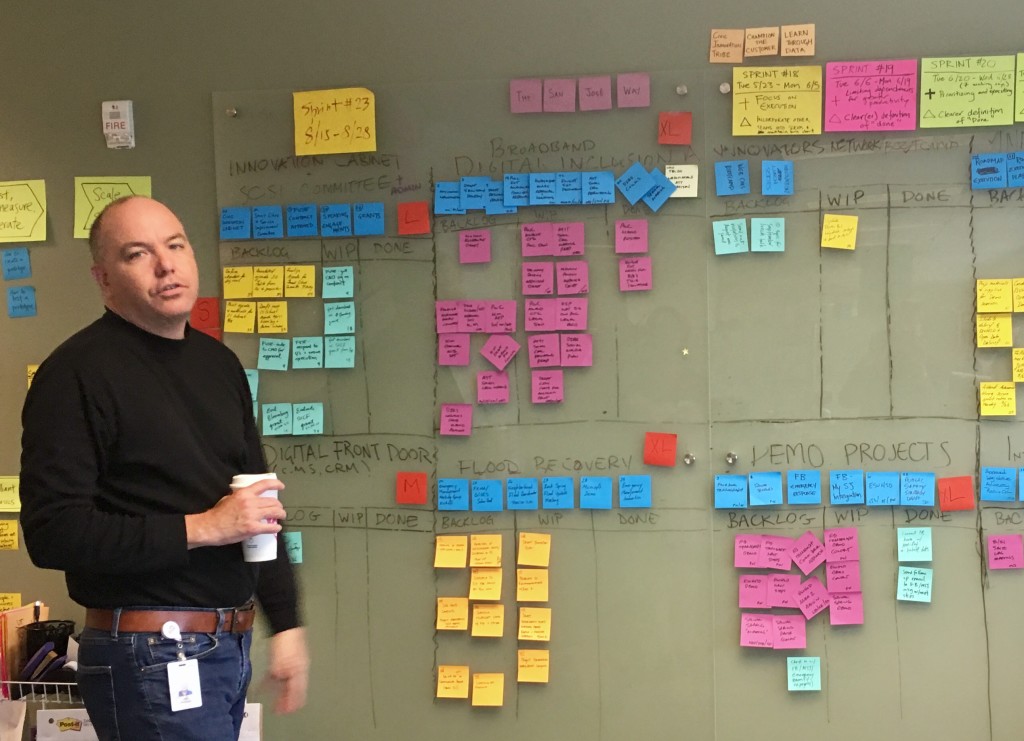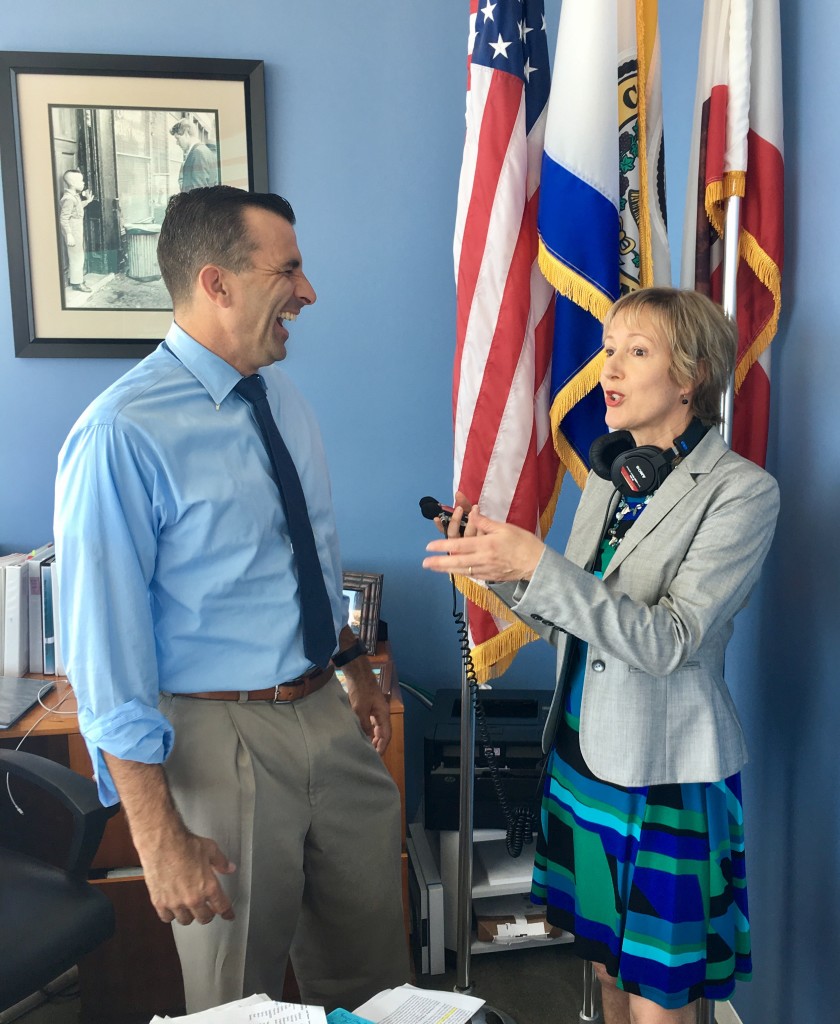As dramatic images of the Texas floods pour in, it’s timely to ask: would a tech mindset help cities be more responsive and efficient in their disaster response? The concept of transforming the culture of a city hall by adopting a tech approach is what I’ve been exploring this month for the BBC World Service. How would an agile, innovative tech mindset help to fix problems and meet community needs more quickly? My report aired this week on Business Matters and fellow guest Duncan Clark, Chairman of BDA, shared his perspective from Beijing.
Alison van Diggelen reports from Silicon Valley, on how a tech mindset is helping transform San Jose’s City Hall.
“I’ve been really encouraged with how willing people are to try new things. We’re seeing a culture shift here at city hall, that is interested in learning about technology and process improvement and customer driven innovation,” Erica Garaffo, Data Analytics Lead at San Jose City Hall
Listen to the BBC podcast (starts @16:30) or to podcast segment below
Here’s a transcript of the segment, edited for length and clarity:
The BBC’s Fergus Nicoll: We’ve been talking about urban management and weather. Time now to talk about simple urban management in the context of cities that aren’t content to wait for federal infrastructure investment. Alison’s been investigating this in San Jose, in the heart of Silicon Valley…
Alison van Diggelen: Some city managers are not holding their breath with the current administration in D.C. The Trump administration is behind on all major promises (infrastructure investment, tax reform etc.); so, here in San Jose, they’re adopting a tech approach to make City Hall more efficient, accessible and responsive to community needs like flooding. San Jose is leveraging its location in the heart of Silicon Valley to lead the charge. I’ve been exploring their game plan and I started by visiting Diridon Station, the main transport hub in San Jose’s city center, to find out from the locals what they think of the city.
[Atmos: Train, plane, bus traffic in downtown San Jose]
Glen Abbott: What public works you see being done are extensive street modifications and drainage that go on and on and on and never seem to reach completion! Somebody is buttering somebody else’s toast…
Chelsea Conrad: There’s a lot of graffiti and trash I’ve noticed…I think it should be cleaned up…It’s kind of an eyesore…
Alison van Diggelen: Meet Kip Harkness. He’s deputy city manager of San Jose, the self described “Capital of Silicon Valley.” Harkness dresses a la Steve Jobs in black turtleneck and blue jeans. A former Director at PayPal; today he wants to bring innovation and the “speed of business” to civic life in San Jose. With the enthusiasm of a tech evangelist, he demos the city’s latest release on his smartphone: It’s an app called “My San Jose”

Kip Harkness: Here we are at City Hall – you can see the pinpoints that are requests…you can see illegal dumping. Lots of illegal dumping!
Alison van Diggelen: Does it scare you to see so many complaints?
Kip Harkness: It’s excites me. Now we know what the issues are. About 10,000 people have already downloaded the app…
Alison van Diggelen: He’s assembling what he calls “a tribe of innovators” to transform City Hall.
Kip Harkness: So we found some graffiti…it asks me if I want to take a picture. It confirms the location. Done, submitted, reference request is in there. Hopefully over the course of the day it will be processed in the system and that status will be updated.
[Atmos: scrum meeting discussion with Michelle Thong…laughter…]
Alison van Diggelen: I meet his “tribe” on the 17th floor of City Hall just before their daily “scrum” – a 15 minute standup meeting. Participants move sticky notes across a giant board to show the progress of their projects. An entire wall becomes a super-sized multicolored spreadsheet. Harkness enthuses about the nimble goal-setting approach and team peer pressure which speeds up action…
Kip Harkness: Championing the customer, learning from data and iterating to improve set apart the tribe. In typical government you do it all at once and push it out the door. We have a scrum cycle – a 2 week process, we reset goals, we evaluate how well we did. Every day we check in on our progress. Running government on scrum, as agile, is a completely different mindset from the traditional 5-7 years plans that characterize our history.
Alison van Diggelen: Erica Garaffo leads the team’s data analytics. She says her background in industrial engineering taught her about process improvement and ways to streamline business operations. She’s finding that can make big difference in delivering community services.
Alison van Diggelen: Would you say you “think different”?
Erica Garaffo: Yes! [laughter] Having the data lens affords me interesting perspective… from data we can see patterns, get insights, and we can take action… I’ve been really encouraged with how willing people are to try new things. We’re seeing a culture shift here at city hall, that is interested in learning about technology and process improvement and customer driven innovation…
Alison van Diggelen: San Jose’s Mayor, Sam Liccardo is helping drive this tech-centered approach.

Mayor Liccardo: We’re blessed to serve a community that’s the most innovative in the world…We’ve tried to create a platform here in the city for innovation – from great companies all around us, from our budding entrepreneurs. We’ve got a program called “Unleash your Geek” that’s got hundreds of folks from San Jose State University and others coming up with ideas to help us solve civic problems.
Alison van Diggelen: The City is partnering with Facebook to launch “Terragraph” in downtown San Jose – a new wireless internet system they say will offer the “fastest free wifi in the world.” It’s also partnering with a dozen tech companies to launch an autonomous vehicle pilot program on city streets.
Of course, San Jose is not unique in adopting a tech mindset. Many global cities are getting techie, from London to Singapore, and Berlin to Nairobi. But as Harkness point out, San Jose has a huge comparative advantage:
Kip Harkness: Literally down the street we have Adobe, the Paypal HQ, Cisco HQ in San Jose…Intel, Apple, Facebook, Google all within 30 miles of our city hall building. We can open up and chunk out our problems to all these tech companies and create a living laboratory for them try out new approaches, new tech and for us to learn from that secret sauce of Silicon Valley.
Fergus Nicoll: Great piece Alison. We’ve got some new expressions for you today: “running government on scrum;” “chunking out programs”… Is this going to work in China, Duncan?
Duncan Clark: China has a top down belief in technology. A lot of the senior officials are engineers themselves…sometimes they place too much emphasis on this. The key factor is the people in China are embracing technology, particularly through their smartphones. One example would be these Mobikes….where you can hop on a bike anywhere in Beijing or Shanghai or across the country. These are dockless bikes, so you don’t have to return them as you would in New York, London or Paris. You leave them anywhere, they have a GPS, and that’s contributing to a reduction in traffic… This is the private sector: Alibaba and Tencent are backing companies like these. The government also is also very on the ball on tech…
Continue listening to the BBC’s Business Matters program, as we discuss:
The potential benefits and synergies from the Whole Foods-Amazon merger
The Hyperloop: why it’s a crazy idea; and yet why it’s unwise to under-estimate Elon Musk’s latest brainchild.




